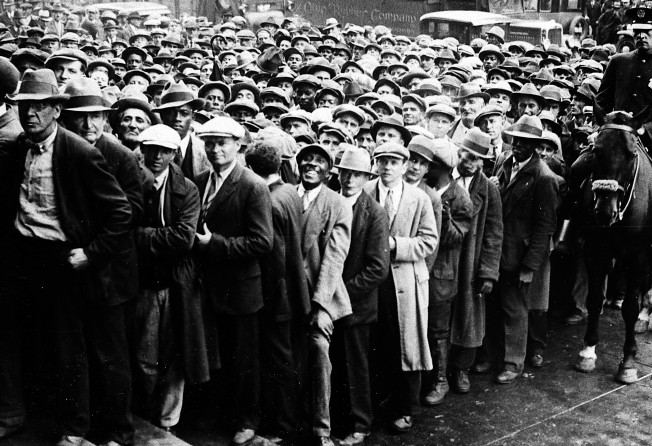Fixed exchange rates, economic crisis and radical populist politics
Asian financial crisis was Hong Kong’s ‘great depression’

Severe financial and economic crises that are not corrected quickly can have severe political consequences. For example, one of the most horrible political consequences of the Great Depression was the rise of fascism in Europe.
Now, eight years into the 2008 global economic crisis, the return of populist political extremism in many corners around the world is demonstrating again that prolonged economic insecurity combined with xenophobia can polarise and fractionalize the political landscape.
The leading appeal of right wing and left wing populists is that mainstream democratic politicians are failing to get us out of this crisis. This was also the case in the 1930s.
Milton Friedman blamed the economic and political consequences of the Great Depression in the US mostly on the tight monetary policy of the Federal Reserve Bank. He also blamed the Gold Standard because it limited the freedom of governments to conduct independent monetary and fiscal policy to stabilise the domestic economy.
Under a fixed exchange rate regime, governments can only resort to devaluing their currencies in a bid to push the pain of domestic adjustment onto other countries. For this reason, Friedman advocated free-floating exchange rates among major open economies to restore the autonomy of macroeconomic policy.
The euro is also a fixed exchange rate arrangement and it has worsened the ability of many European countries to pursue independent domestic stabilisation programmes in the aftermath of the 2008 global economic crisis. Friedman opposed the euro project from the very start, fearing this very situation.
There are economic and political parallels between the Great Depression, today’s euro zone countries, and Hong Kong in the wake of the 1997 Asian financial crisis. This was Hong Kong’s “great depression” and the linked exchange rate its “gold standard”.
The scale and impact of deflationary pressures from the Asian crisis were second only to the Great Depression in terms of intensity and duration. Cumulative nominal GDP in Hong Kong fell by 9.5 per cent; the drop in the US in the 1930s was 11 per cent.
Unemployment was less of a concern here but wealth disparity and the insecurity of being without property in a city with rising housing prices were intensified and still remain.
When property values began to recover after 2003, and again after 2008 with quantitative easing, existing property owners saw their negative equity values fully recuperate, but newcomers could not afford to enter the market.
This created a growing economic divide that was exacerbated by rising divorce rates, subdivided housing for young families, and growing numbers of the poor and elderly being concentrated in remote public rental housing estates. The sense of imposed isolation and helplessness has grown.
Meanwhile, large numbers of new immigrants have been coming across from the mainland for family reunion purposes as cross-border marriages and remarriages continue to stay high.
The city’s residents, its social and economic milieu, have been remade in the process. Every single one of these changes has happened gradually at the micro level, but together their scale, variety and pace are massive.
While the community is in a sense enriched through greater diversity, it is also polarised and fractionalized.
Pockets of political extremism can be found both on the left and on the right in Hong Kong, due to the failure of policy to recognise and prevent or at least minimise the rise of economic disparity. The left wants massive redistribution and the right wants to keep out outsiders through violently discriminatory practices.
Unless the growing economic disparities in society are addressed, populist politics – whether on the right or the left – will continue to have a market.
Interestingly, Friedman did not support free floating exchange rates for a small open economy like Hong Kong. Instead he advocated preserving the robustness of the underlying economic foundations – things such as fiscal prudence, banking safety, and flexible labour markets with minimal labour legislation – to facilitate fast adaptation to the inevitable external shocks.
Hong Kong has by and large stayed close to this course of action. And that is why we emerged from the severe Asian crisis without an American New Deal or a German fascist dictatorship.
But correcting the lingering economic disparity still needs smart government intervention. The root cause of such economic disparity is the unequal incidence of rising property prices. The government has an undeniable responsibility in this matter because of its monopoly over land ownership and its supply.
If Hong Kong wants to avoid extremist politics, it must cure the effects of three decades of social and economic transformations and the ravages of the Asian financial crisis and the 2008 global financial crisis. This requires government to address the economic disparities first in housing wealth, and second to invest in education (especially early childhood education) to prevent the current inequalities from passing on to the next generation.
Richard Wong Yue-chim is Philip Wong Kennedy Wong Professor in Political Economy at the University of Hong Kong